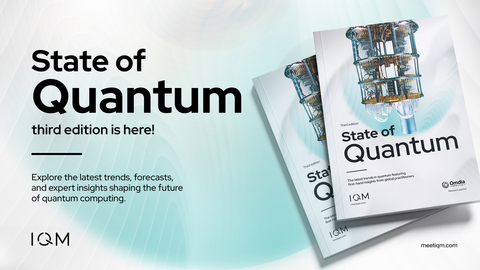IQM’s State of Quantum 2025: Quantum Industry Must Solve Talent Shortage and Software Platforms, Not Just Qubits
IQM’s State of Quantum 2025: Quantum Industry Must Solve Talent Shortage and Software Platforms, Not Just Qubits
- The report predicts that quantum computing market will hit over $22 billion globally by 2032 as commercial deployments accelerate.
- Highlights how AI, high-performance computing (HPC), and quantum technology are converging to drive the next wave of growth.
- This is the third edition of the state of quantum report by IQM Quantum Computers.
ESPOO, Finland--(BUSINESS WIRE)--IQM Quantum Computers in collaboration with analyst firm Omdia (LON:INF), today unveiled the third edition of its State of Quantum Report, revealing that the quantum industry must address talent shortages and software development kits (SDK) gaps in order to scale beyond just qubit count.
As quantum computing shifts from theoretical promise to practical integration, the report projects that the global quantum computing market will reach over $22 billion by 2032 as commercial deployments accelerate.
The findings also show that 75% of respondents believe that defining the right applications is the most critical factor for adoption. As Dr. Jan Goetz, Co-CEO and Co-founder of IQM, noted in his foreword, “Quantum’s promise is clear, but fulfilling it requires orchestrated progress across the hardware and software stack—transforming these powerful machines from niche tools into drivers of real-world outcomes.”
The report also argues that progress hinges on synchronising hardware industrialisation with software platform maturity. Today, software development kit fragmentation hampers portability and slows adoption in multi-vendor settings.
HPC, Quantum, and AI Integration
The report also highlights how high-performance computing (HPC), quantum computing, and AI are converging to drive the next wave of growth. According to industry experts, investors, and users across Europe, North America, Asia, and Oceania interviewed, HPC provides the robust infrastructure and orchestration needed to integrate quantum systems into real-world environments, ensuring that quantum and classical resources work in harmony.
This synergy promises to accelerate adoption, amplify returns for early adopters, and transform quantum computing from a niche capability into a trusted part of the broader scientific and industrial toolbox.
“Our interviewees identified three major challenges – one is getting to the level of reliability where quantum computers can be considered industrial products rather than crafted laboratory devices, another is improving the software layer to provide the sort of developer experience we see in the high-level frameworks used for AI, and a third is helping users identify opportunities to benefit from quantum computer and set up their experiments. Interestingly, the interviewees are expecting multiple quantum technologies to co-exist, with a degree of specialisation between them,” said Alexander Harrowell, Principal Analyst, Advanced Computing at Omdia.
Key Findings and Market Trends
- Sector Readiness: 57% of survey respondents placed drug-discovery and molecular-modelling workloads as their top quantum priority list, ahead of finance and chemicals.
- Funding: After a dip in 2023, venture funding surged again in 2024, with 58% of cumulative quantum venture funding still flowing to North American firms, with average deal sizes ($38M) triple those in Europe ($12M).
- Challenges Ahead: Talent shortages in quantum and growth-stage funding outside the US are the two biggest systemic risks to the industry’s continued growth.
In addition, the report also calls for three critical priorities to turn these insights into tangible outcomes:
- Better Abstraction Layers: Bridging the gap between the physics of qubits and the practical problems that matter to businesses.
- Unified Orchestration and Scheduling: Enabling quantum and classical HPC resources to operate seamlessly together.
- Cross-Disciplinary Collaboration: Fostering teams that blend quantum expertise, domain knowledge, and software development—creating a new generation of problem-solvers.
Download the full report here: State of Quantum 2025 Report.
About IQM Quantum Computers:
IQM is a global leader in superconducting quantum computers. IQM provides both on-premises full-stack quantum computers and a cloud platform to access its computers. IQM customers include the leading high-performance computing centres, research labs, universities and enterprises which have full access to IQM's software and hardware. IQM has over 300 employees with headquarters in Finland and a global presence in France, Germany, Italy, Japan, Poland, Spain, Singapore, South Korea and the United States.
Contacts
Media contact:
Email: press@meetiqm.com
Mobile: +358504790845
www.meetiqm.com

